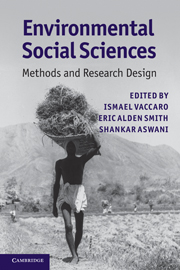Book contents
- Frontmatter
- Contents
- Contributors
- Foreword
- Preface
- 1 Introduction
- 2 People, numbers, and natural resources: demography in environmental research
- 3 Production decisions and time allocation: a guide to data collection
- 4 Analyzing the politics of natural resources: from theories of property rights to institutional analysis and beyond
- 5 Extreme events, tipping points, and vulnerability: methods in the political economy of environment
- 6 Local communities and natural resources: ethnobiology in practice
- 7 Mapping histories: cultural landscapes and walkabout methods
- 8 Metaphors and myths in news reports of an Amazonian “Lost Tribe”: society, environment and literary analysis
- 9 Water decision-makers in a desert city: text analysis and environmental social science
- 10 Linking human and natural systems: social networks, environment, and ecology
- 11 Khat commodity chains in Madagascar: multi-sited ethnography at multiple scales
- 12 Spatiotemporal methodologies in environmental anthropology: geographic information systems, remote sensing, landscape changes, and local knowledge
- 13 Deep time, diachronic change, and the integration of multi-scalar data: archaeological methods for exploring human–environment dynamics
- 14 Comparing trajectories of climate, class, and production: an historical ecology of American yeomen
- 15 Socioecological methods for designing marine conservation programs: a Solomon Islands example
- Index
- References
8 - Metaphors and myths in news reports of an Amazonian “Lost Tribe”: society, environment and literary analysis
Published online by Cambridge University Press: 05 June 2012
- Frontmatter
- Contents
- Contributors
- Foreword
- Preface
- 1 Introduction
- 2 People, numbers, and natural resources: demography in environmental research
- 3 Production decisions and time allocation: a guide to data collection
- 4 Analyzing the politics of natural resources: from theories of property rights to institutional analysis and beyond
- 5 Extreme events, tipping points, and vulnerability: methods in the political economy of environment
- 6 Local communities and natural resources: ethnobiology in practice
- 7 Mapping histories: cultural landscapes and walkabout methods
- 8 Metaphors and myths in news reports of an Amazonian “Lost Tribe”: society, environment and literary analysis
- 9 Water decision-makers in a desert city: text analysis and environmental social science
- 10 Linking human and natural systems: social networks, environment, and ecology
- 11 Khat commodity chains in Madagascar: multi-sited ethnography at multiple scales
- 12 Spatiotemporal methodologies in environmental anthropology: geographic information systems, remote sensing, landscape changes, and local knowledge
- 13 Deep time, diachronic change, and the integration of multi-scalar data: archaeological methods for exploring human–environment dynamics
- 14 Comparing trajectories of climate, class, and production: an historical ecology of American yeomen
- 15 Socioecological methods for designing marine conservation programs: a Solomon Islands example
- Index
- References
Summary
Introduction
In the last days of May 2008, striking photos and accompanying stories of an Amazonian “Lost Tribe” found their way into an array of international news sources. One particularly arresting image of this previously “uncontacted” group – three natives in red and black body paint firing arrows from longbows at a low-flying aircraft – was beamed around the world (see Figure 8.1). By the end of June, however, a number of news organizations had dismissed accounts of the Lost Tribe as a hoax. Although others continued to energetically defend the story’s basic outlines – which were, indeed, true – it was now clear to all that the group in question had first been contacted a full century earlier and that the leader of the photographic mission had been fully aware of the “lost” tribe’s existence for some time.
The mission leader’s assertions that he had taken the photos expressly to rally worldwide opposition to illegal logging on the Brazil–Peru border made it easy for some news sources to write off the story as one more cautionary tale about news-hungry journalists and easily swayed publics. However, it is also possible to see the case as proof of the ongoing power of long-existing metaphors and myths that acquire new meanings within contemporary political and economic contexts. By “myths,” I do not mean fallacies, but rather symbolic expressions of collective beliefs and deep concerns that affect the perception and presentation of apparent facts. The often complex ways in which different groups of environmental actors use these tropes for different ends is both the focus of this chapter and the true moral of this story of a not-all-that-Lost Tribe.
- Type
- Chapter
- Information
- Environmental Social SciencesMethods and Research Design, pp. 157 - 187Publisher: Cambridge University PressPrint publication year: 2010



